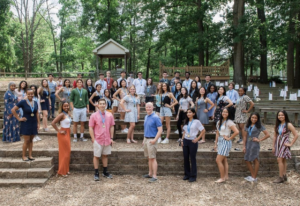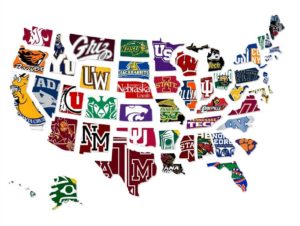Internship introspections
Junior Aryamann Singh believes that behind every extracurricular, there must be genuine interest: “If you’re checking off a box, you won’t really have much to say in earnest on college applications.”
February 2, 2022
“There is so much mental math that goes into the meticulous framing of every single thing you do in order to get into college, and it’s rarely about just enjoying something,” junior Isha Satapathy said. From anxiety to excitement, or a lingering feeling that we might not be pursuing as many opportunities as we should, the thought of internships can trigger a variety of feelings in Jefferson students. On one hand, they provide valuable experience and boost their chances for college admissions, on the other, they are yet another source of stress as students navigate high school.
Junior Zack Yashar explains that this stress comes from a fear of missing out mentality, “Everyone seems to jump on every opportunity they get, which is a good thing. But there’s definitely a mentality that you either have to have an internship or something else interesting [to succeed],” Yashar said.
This leads to a situation where students feel obliged to pursue academic and work opportunities, even when they do not have an intrinsic desire to do so. As junior Isha Satapathy explains, this means students often pursue internships and extracurriculars outside of their interests.
“External pressure is still very much a factor in what exactly we decide to pursue during our high school career. I have had conversations with close friends who are considering doing extracurricular opportunities they don’t want to do, just for college. And this doesn’t even just begin and end with internships. This goes for so many different extracurricular activities at TJ,” Satapathy said. “It’s a bit depressing to see how much people push themselves just to get into a good college.”
Satapathy explains that the distorted view of academic opportunities at Jefferson contributes to the growing problems of depression and burnout.
“[They’ll say,] ‘I’m not working hard enough’, when they are literally debate captain, part of NHS, part of some other student administration organization, and they play sports. People will get burned out and feel guilty about it, and instead of taking the time to rest, they just keep pushing,” Satapathy said. “At what point are [students] putting their nose to the grindstone for the sake of college?”
Junior Aryamann Singh points at that, unlike other stressful topics, internship pressure isn’t discussed as frequently among friend groups, which leaves students with fewer places to vent.
“I’m mostly on my own,” Singh said. “I haven’t seen many students talking about their own internships. It’s very competitive and it definitely worsens’ people’s mental health.”
At the same time, some students may believe that there is nothing inherently wrong with pursuing an activity or internship for the sole purpose of college; if they’re willing to put in the work, why does it matter?
“I think it’s a lose-lose situation, wasted time. If you’re checking off a box, you won’t really have much to say in earnest on college applications,” Singh said.
Additionally, Satapathy mentioned that the excessive pursuit of academic opportunities hurts passionate students.
“You’re taking away opportunities from students who may actually enjoy that activity, but aren’t able to. The field is oversaturated with people who don’t really enjoy that activity, but do it anyway,” Satapathy said.
A college-driven mentality to clubs and academic opportunities can also create a toxic environment, where students may care more about their titles than making an activity pleasant.
“I truly do wish that people at the school didn’t take college so seriously, because it makes it legitimately horrific to go through so many different activities,” Satapathy said. “In some activities, it has become so toxic that any sense of enjoyment is completely gone.”
So, how can you fix Jefferson’s broken internship and extracurricular culture? Satapathy says you can rethink activities that don’t bring you joy, and being unafraid to let go and start again.
“As daunting as it can be to switch junior year, for instance, from one [activity] to another, if you have enough of an interest in that new thing that you’re pursuing, you can pretty easily catch up to where you want to be,” Satapathy said. “If you feel that you can’t, then I think at the end of the day, it’s always more important to make sure that you are spending your time in a way that you won’t regret.”
If you’re still in doubt, Satapathy recommends visiting the college and career center for additional advice.
“We have a wonderful college and career center specialist who you should definitely go check out who helps you pursue the things [you’re interested in],” Satapathy said.









